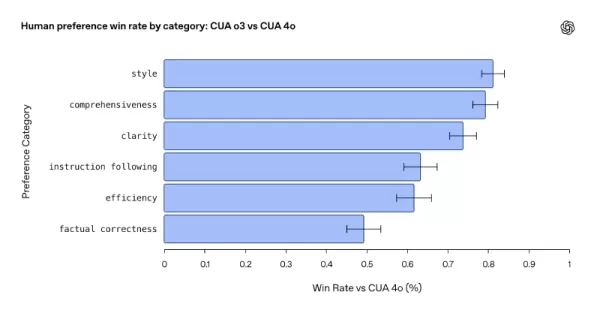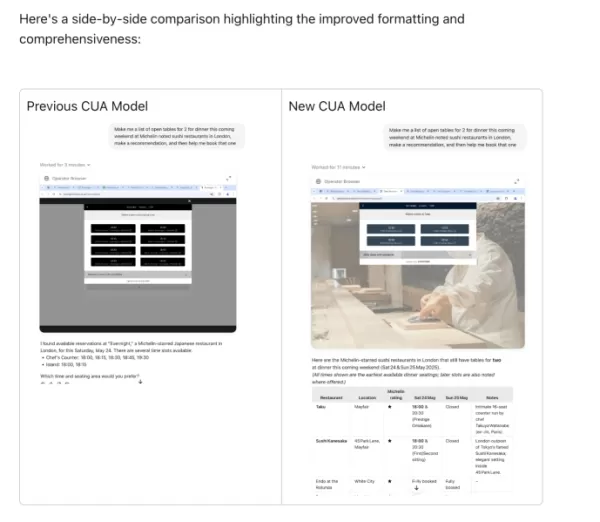OpenAI Upgrades ChatGPT Pro to o3, Boosting Value of $200 Monthly Subscription
This week witnessed significant AI developments from tech giants including Microsoft, Google, and Anthropic. OpenAI concludes the flurry of announcements with its own groundbreaking updates - extending beyond its high-profile $6.5 billion acquisition of Jony Ive's design firm for an ambitious hardware initiative codenamed "io".
The company has significantly enhanced its Operator autonomous web navigation system within ChatGPT, transitioning from the previous GPT-4o framework to the advanced o3 reasoning model. This global rollout, available since May 23, 2025, currently operates in beta phase for ChatGPT Pro subscribers at the $200 monthly tier.
While labeled a "research preview" - indicating ongoing refinement - the update arrives as competitive pressure intensifies. Google's premium AI suite, typically priced around $250 (currently discounted to $125 for the first quarter), offers access to Gemini, Imagen, and Veo models, making OpenAI's offering appear more competitively positioned.
Understanding OpenAI's Operator
Originally launched in January 2025, Operator represents OpenAI's pioneering venture into semi-autonomous Computer Using Agents (CUAs). This technology expands ChatGPT's capabilities beyond conversational interfaces to executing tangible web-based operations.
The system autonomously handles browsing tasks including navigation, data input, and transactional processes - from securing restaurant reservations to compiling research data. For security, Operator functions through a dedicated cloud-based virtual browser (operator.chatgpt.com) rather than accessing local browsers, featuring robust safeguards including real-time user oversight and restricted access to sensitive platforms.
Enterprise applications have demonstrated Operator's versatility across business travel coordination and government service navigation, highlighting its cross-industry potential.
o3 Model Enhancements
The upgrade delivers measurable improvements across three critical dimensions:

- Task completion rates increased by 13% on the OSWorld benchmark (42.9 vs 38.1)
- WebArena performance improved by 31% (62.9 from 48.1)
- GAIA benchmark achievement surged fivefold (62.2 versus 12.3)
User experience evaluations indicate strong preference for o3's structured outputs, with 78% favoring its detailed, tabular presentation of restaurant reservations including location analytics and quality metrics, compared to the previous version's less-organized outputs.

Security Framework
The enhanced model maintains rigorous protective measures:
- 94% sensitive action confirmation rate (100% for financial transactions)
- 3% reduction in prompt injection vulnerabilities (20% vs 23%)
- Maintained restrictions on high-risk platform access
OpenAI's system documentation confirms the model remains below critical risk thresholds for biological/chemical applications and lacks direct coding environment access.

Enterprise Applications
Technical leaders across industries can leverage upgraded Operator for:
- ML Engineers: Streamlined model validation processes
- Data Specialists: Automated web-based data verification
- Security Teams: Safe behavioral simulation for audits
- IT Orchestration: Reliable browser task automation
The solution combines enhanced capability with built-in risk mitigation, presenting a balanced tool for modern digital operations. Currently, the Responses API continues operating on GPT-4o architecture, with migration timelines undefined.
Related article
 Manus Debuts 'Wide Research' AI Tool with 100+ Agents for Web Scraping
Chinese AI innovator Manus, which previously gained attention for its pioneering multi-agent orchestration platform catering to both consumers and professional users, has unveiled a groundbreaking application of its technology that challenges convent
Manus Debuts 'Wide Research' AI Tool with 100+ Agents for Web Scraping
Chinese AI innovator Manus, which previously gained attention for its pioneering multi-agent orchestration platform catering to both consumers and professional users, has unveiled a groundbreaking application of its technology that challenges convent
 Nonprofit leverages AI agents to boost charity fundraising efforts
While major tech corporations promote AI "agents" as productivity boosters for businesses, one nonprofit organization is demonstrating their potential for social good. Sage Future, a philanthropic research group backed by Open Philanthropy, recently
Nonprofit leverages AI agents to boost charity fundraising efforts
While major tech corporations promote AI "agents" as productivity boosters for businesses, one nonprofit organization is demonstrating their potential for social good. Sage Future, a philanthropic research group backed by Open Philanthropy, recently
 Top AI Labs Warn Humanity Is Losing Grasp on Understanding AI Systems
In an unprecedented show of unity, researchers from OpenAI, Google DeepMind, Anthropic and Meta have set aside competitive differences to issue a collective warning about responsible AI development. Over 40 leading scientists from these typically riv
Comments (0)
0/200
Top AI Labs Warn Humanity Is Losing Grasp on Understanding AI Systems
In an unprecedented show of unity, researchers from OpenAI, Google DeepMind, Anthropic and Meta have set aside competitive differences to issue a collective warning about responsible AI development. Over 40 leading scientists from these typically riv
Comments (0)
0/200
This week witnessed significant AI developments from tech giants including Microsoft, Google, and Anthropic. OpenAI concludes the flurry of announcements with its own groundbreaking updates - extending beyond its high-profile $6.5 billion acquisition of Jony Ive's design firm for an ambitious hardware initiative codenamed "io".
The company has significantly enhanced its Operator autonomous web navigation system within ChatGPT, transitioning from the previous GPT-4o framework to the advanced o3 reasoning model. This global rollout, available since May 23, 2025, currently operates in beta phase for ChatGPT Pro subscribers at the $200 monthly tier.
While labeled a "research preview" - indicating ongoing refinement - the update arrives as competitive pressure intensifies. Google's premium AI suite, typically priced around $250 (currently discounted to $125 for the first quarter), offers access to Gemini, Imagen, and Veo models, making OpenAI's offering appear more competitively positioned.
Understanding OpenAI's Operator
Originally launched in January 2025, Operator represents OpenAI's pioneering venture into semi-autonomous Computer Using Agents (CUAs). This technology expands ChatGPT's capabilities beyond conversational interfaces to executing tangible web-based operations.
The system autonomously handles browsing tasks including navigation, data input, and transactional processes - from securing restaurant reservations to compiling research data. For security, Operator functions through a dedicated cloud-based virtual browser (operator.chatgpt.com) rather than accessing local browsers, featuring robust safeguards including real-time user oversight and restricted access to sensitive platforms.
Enterprise applications have demonstrated Operator's versatility across business travel coordination and government service navigation, highlighting its cross-industry potential.
o3 Model Enhancements
The upgrade delivers measurable improvements across three critical dimensions:

- Task completion rates increased by 13% on the OSWorld benchmark (42.9 vs 38.1)
- WebArena performance improved by 31% (62.9 from 48.1)
- GAIA benchmark achievement surged fivefold (62.2 versus 12.3)
User experience evaluations indicate strong preference for o3's structured outputs, with 78% favoring its detailed, tabular presentation of restaurant reservations including location analytics and quality metrics, compared to the previous version's less-organized outputs.

Security Framework
The enhanced model maintains rigorous protective measures:
- 94% sensitive action confirmation rate (100% for financial transactions)
- 3% reduction in prompt injection vulnerabilities (20% vs 23%)
- Maintained restrictions on high-risk platform access
OpenAI's system documentation confirms the model remains below critical risk thresholds for biological/chemical applications and lacks direct coding environment access.

Enterprise Applications
Technical leaders across industries can leverage upgraded Operator for:
- ML Engineers: Streamlined model validation processes
- Data Specialists: Automated web-based data verification
- Security Teams: Safe behavioral simulation for audits
- IT Orchestration: Reliable browser task automation
The solution combines enhanced capability with built-in risk mitigation, presenting a balanced tool for modern digital operations. Currently, the Responses API continues operating on GPT-4o architecture, with migration timelines undefined.
 Manus Debuts 'Wide Research' AI Tool with 100+ Agents for Web Scraping
Chinese AI innovator Manus, which previously gained attention for its pioneering multi-agent orchestration platform catering to both consumers and professional users, has unveiled a groundbreaking application of its technology that challenges convent
Manus Debuts 'Wide Research' AI Tool with 100+ Agents for Web Scraping
Chinese AI innovator Manus, which previously gained attention for its pioneering multi-agent orchestration platform catering to both consumers and professional users, has unveiled a groundbreaking application of its technology that challenges convent
 Nonprofit leverages AI agents to boost charity fundraising efforts
While major tech corporations promote AI "agents" as productivity boosters for businesses, one nonprofit organization is demonstrating their potential for social good. Sage Future, a philanthropic research group backed by Open Philanthropy, recently
Nonprofit leverages AI agents to boost charity fundraising efforts
While major tech corporations promote AI "agents" as productivity boosters for businesses, one nonprofit organization is demonstrating their potential for social good. Sage Future, a philanthropic research group backed by Open Philanthropy, recently
 Top AI Labs Warn Humanity Is Losing Grasp on Understanding AI Systems
In an unprecedented show of unity, researchers from OpenAI, Google DeepMind, Anthropic and Meta have set aside competitive differences to issue a collective warning about responsible AI development. Over 40 leading scientists from these typically riv
Top AI Labs Warn Humanity Is Losing Grasp on Understanding AI Systems
In an unprecedented show of unity, researchers from OpenAI, Google DeepMind, Anthropic and Meta have set aside competitive differences to issue a collective warning about responsible AI development. Over 40 leading scientists from these typically riv





























